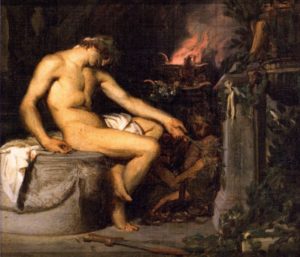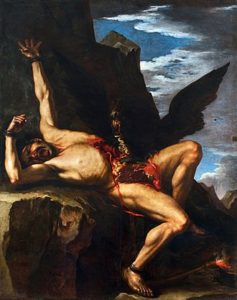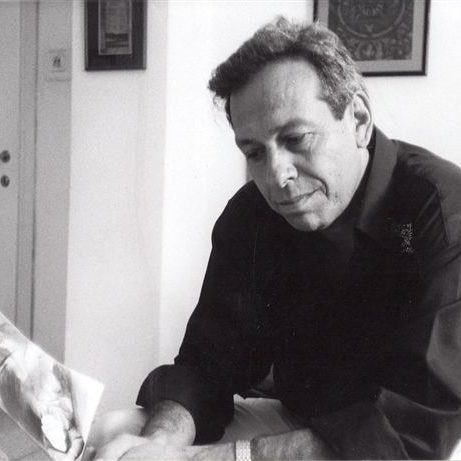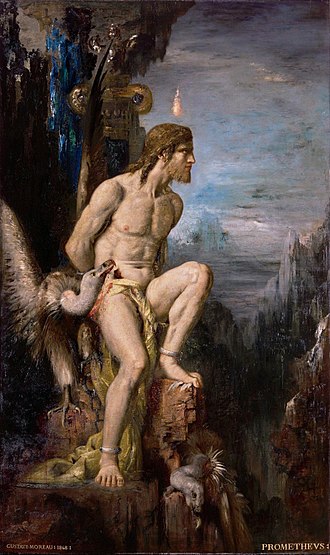The forward-thinking Prometheus the Titan will symbolize the principle and the creative and creative forces in human beings. the creator, innovating forces that sometimes breathe life into the noses and noses of previous generations. Prometheus is, for us, the principle that will create and take care of the interests of his creatures. Prometheus is a generation before the gods, it is like the spark of God in man, existing already before the archetypal differentiation and the distinction between good and evil. The existence before the gods indicates that the power of creation is an ancient force for the gods, an ancient force for archetypes, and an ancient force for the human consciousness.
Greek mythology that for many generations has nothing to do with religion or worship, more than any mythology, is suitable for presentation, demonstration, and archetypal understanding of the structure of the human soul and its development throughout the generations and of the individual throughout his life.
If we compare Jewish mythology for that matter, we see that the biblical stories deal relatively much more with the formation of the chosen Jewish people, the attitude of the people toward their God, and the acceptance of their constitutions, their imperatives, and their fulfillment or non-fulfillment.
Although the biblical stories also bring a version of the creation story and general human development, this part is short and starting with the portion "Lech Lecha" are stories that focus on the ancestors, the formation of the people in the formation of its constitutions, the exit from slavery to freedom, its immigration to the land of choice and the history of life in the Land of Israel.
In addition, the stories of the Bible as an illustration of the archetypal mental development of the individual are too partial because these are stories and testimonies of holiness, which are still used today as part of the Jewish faith, tradition, holidays, and rituals. They are part of the holiness of the Torah ….
Despite all this, it is possible to demonstrate countless examples of interesting archetypal stories from them.
Although there are many examples in the book of Genesis of mental development, this is not mythology that deals with the development of the general human psyche in its various layers from the beginning of its development to the continuation of the expansion towards the recognition of archetypes, the creation of consciousness, the shaping and empowerment of the self, the relationship between consciousness and archetypes and later between consciousness and its relation to the self.
As we have seen, the gods, the archetypes, are semi-human or superhuman beings that develop in a struggle with the first generation of titans (masters). The gods are to become gods only after acting as a unified group that must fight the archaic primordial instinctive wild forces and achieves their higher place on Olympus.
Mythology tells us that the gods cannot achieve their stable and permanent place on Olympus and become the gods of the world, with the help of a more divine higher power, without the creation of man. The gods do not appear as much as they can like the ancient Jewish god, who has always existed and is omnipotent to create or slay! They were created and born similarly to the birth of man and represent a part of it.
The gods are immortal, but they possess human qualities; they are born, develop and sharpen their qualities and uniqueness, and to achieve their place among the gods and in the world, they are interested in what man will create.
The need of the gods for man, his faith and help are interesting to understand, is a need that reminds us that the archetypal world will be able to reach discernment and uniqueness and be expressed in life itself, only with the help of a person who symbolizes the Ego- self as the center of consciousness.
The heroic person will symbolize the development in which both the self and the mind, relatively new to human development, enter the psyche as an archetype. They become key human traits on the archetypal level as well. What makes a man a person!
The tree of knowledge from which the first man ate symbolizes this in the creation story.
But apart from God, what would be the earlier, more archaic human trait that would push man and his development to create consciousness and turn it into an archetype. In the Bible, it is the Snake.
And here, mythology gives us a possible explanation: Zeus, the head of the gods, is supposed to be interested in the creation of man because he needs a human hero for his help. He will also be willing to have him as a kind of father, to fertilize a Human woman for her to give birth to him, but someone must, first of all, create human beings in the first place, and Zeus himself cannot.
After overcoming his father Cronos, Zeus gained authority among the gods and created more gods with the help of Titaness, ready to accept the idea that another Titan is special and not himself who will create human beings.
Creation will come from an ancient being, a principle before the King of the Gods archetype, and not from Zeus, which symbolizes a center of power itself, domination, and fertilization, as a kind of central archetype. The Creator of man must have an ancient archaism, with creative power full of love, compassion, sacrifice, and humanity, in the image of someone who knows how to think ahead and sees what is being born.
Prometheus Human Creator

Prometheus, the forward-thinking titan, will symbolize for us the principle and creative forces in man. the creator, innovating forces that sometimes breathe life into the noses and noses of previous generations. Prometheus is, for us, the principle that will create but also take care of the interests of its creatures. The Titan Prometheus, the generation of the gods and taking their fire, is like the spark of God in man that already exists before the archetypal differentiation and recognition of good and evil. The previous existence testifies that the power of creation is ancient to the gods and to the archetypes.
Suppose we try to apply this to the mental development of the baby and the child and sometimes being stuck in development. In that case, we will see that the creative and creative human spark and the Creator get stuck, and then all the development is delayed. The creation and creation of the human and conscious part will also lead to the stabilization of the archetypal world from which the continuation of development will come and from which the connection to the multitude of the archetypal layers helps the continued construction of the self and its development.
The gods as archetypes, then, will be able to continue the interaction with the self, creating positive and rewarding complexes that give life to the child, the teenager, the adolescent, and the young person.
The help of the gods to man is understandable. Still, both man and his consciousness help the gods, and a mutual interaction begins to be generated that leads to the development of the person, his soul, and his functioning in the world. How it happens, we will look later in the birth of the Hero and his development
After man was created from earth and water- clay, and after the Creator breathes life into them, Prometheus steals from the gods for man the fire, the divine spark that will give him the ability to develop consciousness, to
the continuity of civilization. Giving them the secrets of the gods. It also helps the person who believes, fears, and worships the gods to position himself in a correct place in the face of the Horror of the gods, in the face of the power of the archetypal world. He trains the person to be a person who believes, admires, and works but does not cancel himself and knows how to take care of himself. This concern also develops in the teenager as he gets older – in front of his parents it is like this and is extremely important for his development and his concern for his existence.
The divine spark in the figure of Prometheus, which finally because of his eagerness to create, help and be so pro-man and his development, contradicts the interests of the gods and even threatens them and he must be punished. He must bear in mind that he should not develop the person in the direction of supposedly being God. The ability of creation and creativity inherent in man can also lead him to hubris!
The divine spark must be a restrained matter of fact and subject to the boundaries of the archetypal world, it is not omnipotent. The human trait of being a creator and creator can move him on his mind to forget his limits to be a trickster and enter hubris. The spark must be within limits.
Prometheus

Prometheus is punished and chained to the high Mount Ararat, the vultures eat its liver, and at night the liver regrows.
The Promethea Urge, the concern and the pursuit of knowledge and awareness and in general, takes a toll and 'sucks' the blood of the person, especially when this is accompanied by hubris. The liver that is eaten and sucked, the running, and the lack of listening to self-take a toll on the person, and the tricks do not help. It is squeezed day and night when sleeping; it is refilled. That’s the nature of men.
The Promethea Spark and the subsequent shackling penalty do not provide for the collective human development in general and the individual. There comes a stage in the collective and personal mental development when an additional principle of the Promethea Principle will be added to the development of consciousness.
The next principle that develops and will add to mental development comes through another mythological figure in the form of the Centaur: half man and half horse, whose nickname in mythology is Chiron (the hand). Chiron represents a complex and developing character later. His personal story is difficult and tells of a strange birth. Unlike the rest of the Centaurs, his father is Titan Cronos, the father of the gods, and his mother is the nymph Phalera. The nymph ran away from his father, disguised herself as a mare, and joined among the horses. Cronos also disguised himself as a horse and bred her. When Phalera gave birth to her baby, she was frightened by its half-horse and half-human shape and abandoned it in the forest. The abandoned and strange immortal boy Chiron was adopted by Apollo, the god of wisdom and the sun god of perfection. Continuing Chiron's peculiarity, his abandonment and adoption by the god Apollo made him a wise and powerful creature.
Chiron &Achilles

With the perfect head alongside sensitivity and love, Chiron becomes the wise teacher of the heroes: he knows a lot, teaches the heroes an educator, and loves a person.
But later in life, Chiron was accidentally injured by a stray poisoned arrow fired by the Hero Hercules, and he mortally wounded him. The wound in the lower part of the horse and its ability to heal also makes Chiron a god of medicine; he receives the ability to be the inspiration for healers. It brings the person the ability to become himself to be the wise and wounded caregiver.
Chiron is the one who suffers his wound and volunteers to replace the chained Prometheus and give it its eternity after it has served its punishment for some 30000 generations!
Chiron, the wounded healer who, through the wound, adds to his wisdom, replaces the Promethea Principle in man. The wound, the Achilles Heel (Prometheus also educates and teaches Achilles) is the doorway to further development, which is the awareness that goes beyond the intellect beyond knowledge and education. The awareness through entering the unavoidable mental wound of each one is the possibility of development. As J. Hillman says: "The wound is the uterus of mental development."
Remember, after Prometheus created man and did some of the things stealthily, he was punished and suffered; it had to be that he would be punished until someone immortal came to replace him. After the first Prometheus creates worries and develops, the wounded Chiron the Centaur appears, bringing about further development and healing through the personal wound and the depth of the mental interior, which is a place we humans have beyond ego.
Chiron is like Jesus, bringing man closer to humanity and human suffering, the suffering that develops humanity. It is necessary to have the power of a horse and precise thought; it is necessary to have wisdom and energy to continue the obligatory development. The willingness to suffer also contributes to finding meaning.
Posted in Hebrew on March 28, 2020, By Avi Baumann


